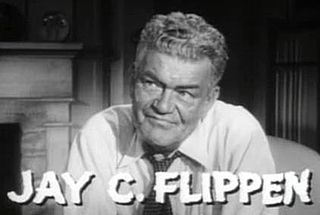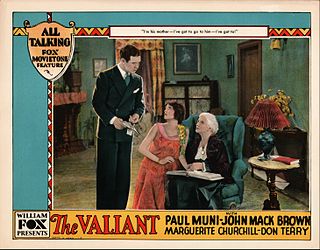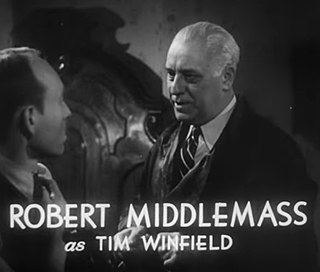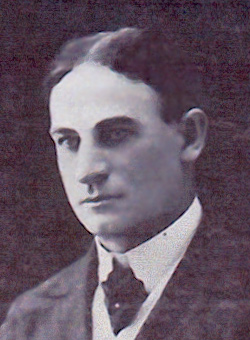
Paul Muni was an American stage and film actor from Chicago. He started his acting career in the Yiddish theater and during the 1930s, he was considered one of the most prestigious actors at the Warner Bros. studio and was given the rare privilege of choosing his own parts.

The Actors' Equity Association (AEA), commonly called Actors' Equity or simply Equity, is an American labor union representing those who work in live theatrical performance. Performers appearing in live stage productions without a book or through-storyline may be represented by the American Guild of Variety Artists (AGVA). The AEA works to negotiate quality living conditions, livable wages, and benefits for performers and stage managers. A theater or production that is not produced and performed by AEA members may be called "non-Equity".

Jay C. Flippen was an American character actor who often played crusty sergeants, police officers or weary criminals in many films of the 1940s and 1950s. Before his motion-picture career he was a leading vaudeville comedian and master of ceremonies.

Bertram Lytell was an American actor in theater and film during the silent film era and early talkies. He starred in romantic, melodrama, and adventure films.

Kathleen Clifford was an American vaudeville and Broadway stage and film actress of the early twentieth century. She was known for her skills as a male impersonator.

The Lone Wolf is the nickname of the fictional character Michael Lanyard, a jewel thief turned private detective in a series of novels written by Louis Joseph Vance (1879–1933). Many films based on and inspired by the books have been made. The character also appeared briefly on radio and television.

The Valiant is a 1929 American pre-Code drama film released by Fox Film Corporation in the Fox Movietone sound-on-film system on May 19, 1929. It is produced and directed by William K. Howard and stars Paul Muni, Marguerite Churchill, and John Mack Brown. Although described by at least one source as a silent film containing talking sequences, synchronized music, and sound effects, The Valiant has continuous dialogue and is a full "talkie" made without a corresponding silent version.

Robert McKim was an American actor of the silent film era and a performer in vaudeville. He appeared in nearly 100 films between 1915 and 1927. He played the arch villain opposite Douglas Fairbanks's Zorro in The Mark of Zorro in 1920.

William Herbert "Bert" Woodruff was an American actor of the silent era.

Neely Edwards was an American vaudeville performer and film actor.

Bernardo De Pace was an actor, musician and comedic vaudeville entertainer of the 1910s and 1920s, billed as "the Wizard of the Mandolin". He learned to play mandolin in the Italian tradition under Francesco Della Rosa. De Pace's repertoire and technique was described in the Brooklyn Life as involving "the most difficult violin and piano compositions, executed at inconceivably rapid tempi demanding an uncanny technique seldom heard on fretted instruments". In 1927 the Minneapolis Star said that he had been recognized as one of the best mandolinists in the United States. It added that he was more than a mandolinist, that his skill was in playing on human emotions as few musicians were able.

Robert Middlemass was an American playwright and stage actor, and later character actor with over 100 film appearances, usually playing detectives or policemen.

Albert Edward Bailey, better known as Bert Bailey, was a New Zealand-born Australian playwright, theatrical manager and stage and screen actor best known for playing Dad Rudd, in both mediums, the character from the books penned by Steele Rudd.
Seven Faces is a 1929 American pre-Code drama film with fantasy elements that was released by Fox Film Corporation in the Fox Movietone sound-on-film system on December 1, 1929. Based upon the piece of short fiction "A Friend of Napoleon" which was published in the June 30, 1923, issue of The Saturday Evening Post magazine by popular writer Richard Connell, it was directed by Berthold Viertel and stars Paul Muni in his second screen appearance. Seven Faces is a lost film, with no excerpts from its footage known to exist.

Alias Ladyfingers, also known as Ladyfingers, is a lost 1921 American silent comedy film based on the 1920 mystery novel Ladyfingers by Jackson Gregory. It was adapted for the screen by Lenore Coffee and was directed by Bayard Veiller. The film stars Bert Lytell, Ora Carew, Frank Elliot, Edythe Chapman, and DeWitt Jennings. The film was produced and distributed by Metro Pictures Corporation.

The Lone Wolf is a 1917 American silent drama film based on the 1914 novel The Lone Wolf by Louis Joseph Vance. Starring Bert Lytell and Hazel Dawn, it was adapted for the screen by George Edwardes-Hall and produced and directed by Herbert Brenon. No prints of the film are known to survive, so it is currently classified as lost.

Harold Everett Porter was an American writer. Under the pen name of Holworthy Hall he published plays, verse, novels and short stories. He took his pseudonym from the dormitory for first-year students where he stayed at Harvard University.

Wilfred Lytell Jr. was an American film actor.
Richard Carlyle was a Canadian born stage and film actor. He is not to be confused with later actor Richard Carlyle. After stage experience, he began appearing in silent films in 1913.

Adrian Michael Morris was an American actor of stage and film, and a younger brother of Chester Morris.


















